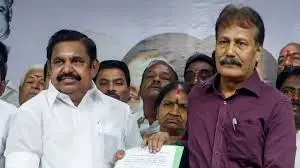In Tamil Nadu, why DMK, AIADMK face crucial alliance test in Rajya Sabha polls

Context: Why These Rajya Sabha Elections Matter
Rajya Sabha elections in Tamil Nadu rarely make headlines. Most of the time, the outcomes are predictable, with parties nominating loyalists or rewarding coalition partners. But this year, the stakes are higher.
With several seats falling vacant and the BJP trying to increase its national influence, every seat in the Upper House counts. For both DMK and AIADMK, these elections are more than just routine — they are about preserving internal unity, sustaining alliance commitments, and signaling national relevance.
DMK’s Alliance Dilemma
The DMK, under Chief Minister M.K. Stalin, heads a strong alliance in the state comprising the Congress, Left parties, VCK, and a few smaller outfits. This coalition, known as the Secular Progressive Alliance (SPA), has so far remained cohesive. However, seat-sharing for the Rajya Sabha could test the resilience of this unity.
With limited Rajya Sabha seats available, not all allies may get a share. The Congress, already feeling neglected after its modest allocation in the Lok Sabha polls, is reportedly eyeing at least one seat. Left parties are also lobbying for representation. But the DMK has its own loyalists and legal luminaries it wants to send to the Upper House.
Balancing internal ambitions with alliance obligations is a tightrope walk. If the DMK appears too domineering, smaller allies may feel sidelined — a risk ahead of the 2026 Assembly elections.
AIADMK’s Fragmented Front
The AIADMK’s situation is even more complex. Ever since the 2021 Assembly defeat, the party has been battling internal strife. The split between Edappadi K. Palaniswami (EPS) and O. Panneerselvam (OPS) has weakened its organizational strength. In the 2024 Lok Sabha elections, the party’s performance was poor, and its alliance with the BJP collapsed amid disagreements over leadership and seat-sharing.
In the Rajya Sabha polls, the AIADMK faces a strategic dilemma. Should it go solo, or align with new partners to remain relevant? With its vote share eroding, the party is struggling to secure even one seat without external support.
There are whispers of the BJP attempting to revive ties, but that comes with political costs. Aligning with the BJP might alienate sections of the AIADMK’s traditional voter base, especially minorities and rural voters. Yet, without support, the AIADMK risks complete marginalization in the Rajya Sabha.
BJP’s Strategic Play
The Bharatiya Janata Party (BJP) may not have a strong legislative presence in Tamil Nadu, but it is an active player in the background. The party is keen to increase its representation in the Rajya Sabha as it prepares for legislative challenges in its third term at the Centre.
Tamil Nadu, with its sizable number of Rajya Sabha seats, is an opportunity. By courting disaffected MLAs or splinter factions, the BJP may hope to engineer surprise wins or back-door entries for friendly candidates.
There are also reports that the BJP is trying to broker alliances — either by reconciling with the AIADMK or tapping into independents. This could complicate the calculations of both Dravidian parties.
Independent MLAs and Smaller Parties: The X-Factor
Tamil Nadu has a few independents and minor party MLAs whose votes could prove decisive if a contest arises. While the DMK has a numerical advantage in the Assembly, a surprise contest could occur if there’s cross-voting or abstentions. These smaller players could become kingmakers — a rare scenario in Tamil Nadu politics.
Signals for 2026 and Beyond
Though the Rajya Sabha polls are not mass elections, the political signals they send are important. For the DMK, smooth alliance management will bolster its image as a stable coalition leader ahead of the 2026 Assembly polls. For the AIADMK, regaining political footing — even if symbolically through one Rajya Sabha seat — could energize its cadres.
These elections will also test the relevance of the BJP in Tamil Nadu. If the party can manage to gain a foothold or support a surprise candidate, it would indicate its growing behind-the-scenes influence in a traditionally hostile state.
Conclusion
The Rajya Sabha elections in Tamil Nadu may seem like a routine legislative exercise, but they are shaping up to be a test of strength, strategy, and survival for the state’s major political players. As the DMK and AIADMK navigate alliance pressures, internal dynamics, and national compulsions, the results will reveal more than just who gets elected — they will show who still holds the political pulse of Tamil Nadu.






